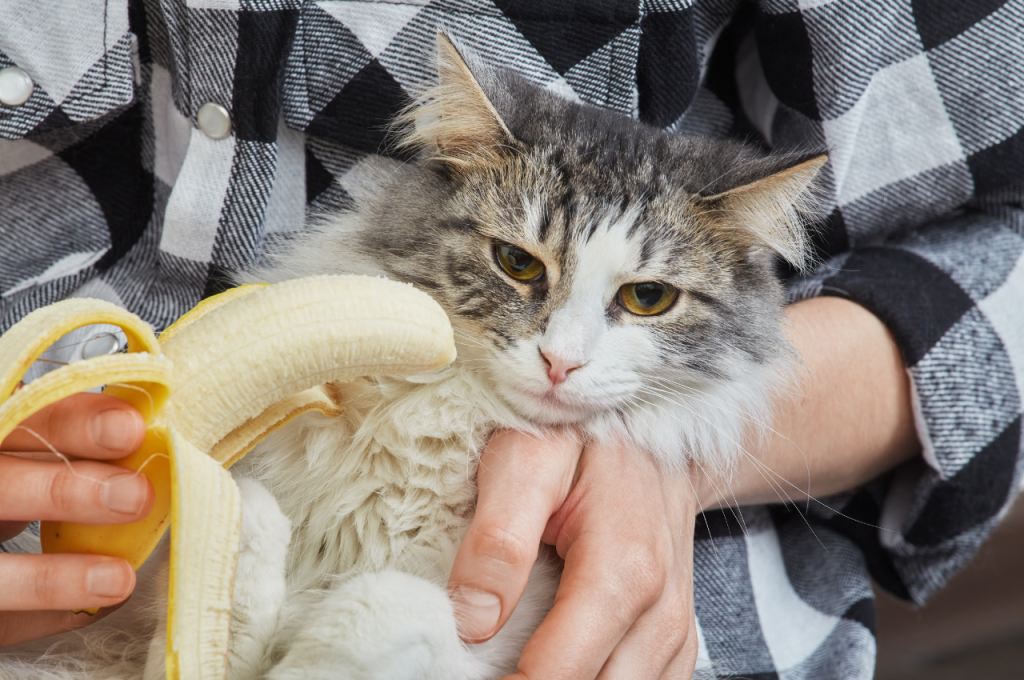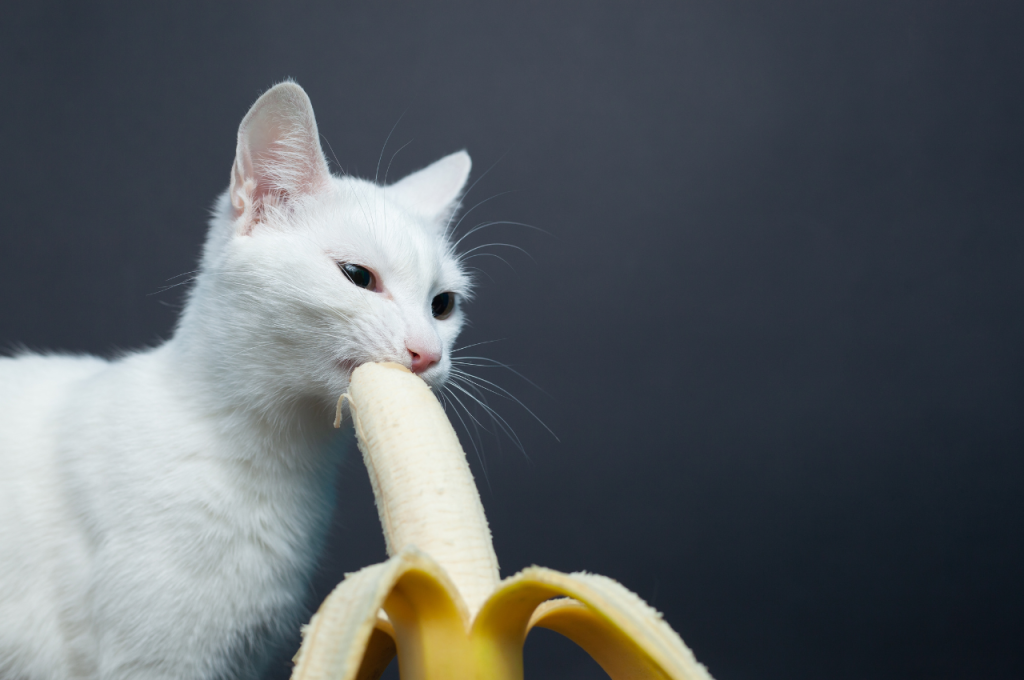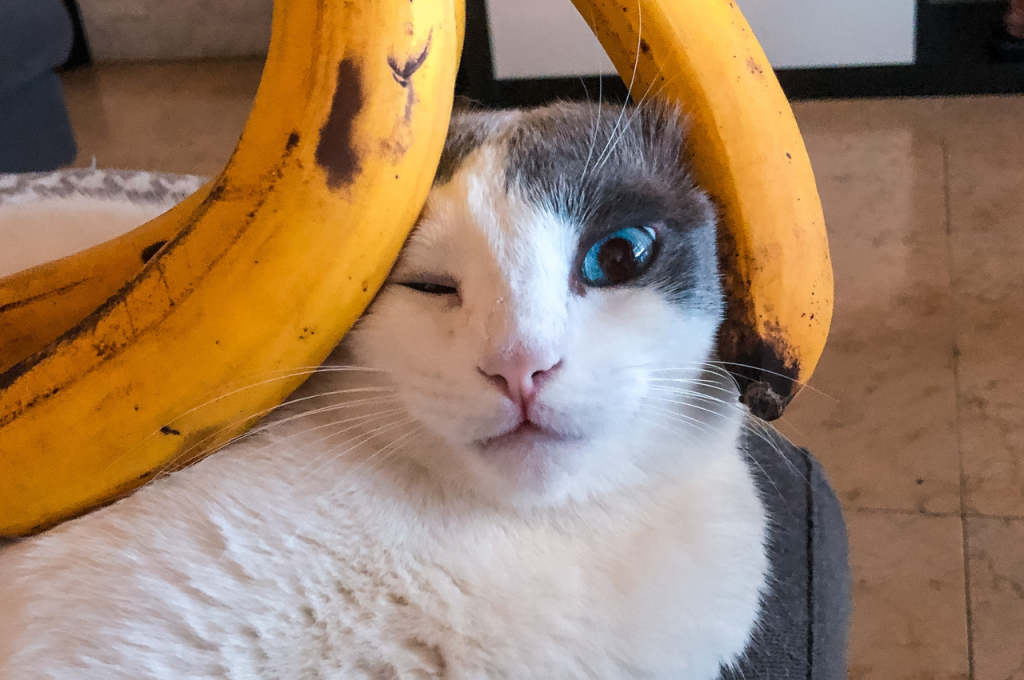Yes, cats can have a small amount of banana as an occasional treat. Bananas should be given sparingly due to their high sugar content.
Cats are known for being picky eaters, but they may show interest in trying new foods like bananas. While they may not get much nutritional benefit from bananas, they can still enjoy the taste and texture as a fun snack.
It’s important to remember that bananas should only be given as an occasional treat and not as a regular part of their diet. As responsible pet owners, it’s crucial to monitor your cat’s reaction to new foods and consult with a veterinarian if you have any concerns about their dietary habits.
The Curiosity of Cats
Cats are known for their innate inquisitiveness about the world around them. This curiosity often leads them to investigate various objects, including fruits like bananas. Let’s delve into the feline fascination with bananas.

Feline Taste Preferences
Cats have a unique taste palate, preferring savory flavors over sweet ones. However, the intrigue of a banana’s aroma might spark their curiosity despite their usual taste preferences.
Curious Banana Encounters
- Sniffing: Cats may sniff a banana curiously, intrigued by its unfamiliar scent.
- Paw Play: Some cats might bat at a banana, testing its texture and responsiveness.
- Taste Test: A daring cat may even take a small nibble of a banana out of sheer curiosity.
Nutritional Value of Bananas
When it comes to exploring what our feline friends can and cannot eat, the question of whether cats can have a banana often comes up. While cats are obligate carnivores and derive most of their nutrition from meat, a small portion of fruits can be included in their diet. Bananas, in particular, are a popular choice for pet owners due to their availability and sweetness. However, before feeding your cat a banana, it is important to consider their nutritional value to ensure their well-being.
Vitamins and Minerals
One of the reasons bananas are considered healthy for humans is their impressive array of vitamins and minerals. Similarly, cats can benefit from some of these nutrients when consumed in moderation. Bananas are an excellent source of vitamin C, which can help boost the immune system and support overall health. In addition, they contain significant amounts of vitamin B6, which promotes brain function and helps maintain a healthy nervous system.
When it comes to minerals, bananas offer a good dose of potassium, which is essential for maintaining proper heart and muscle functions. Potassium also aids in balancing fluids and electrolytes in the body, contributing to optimal hydration. Furthermore, bananas contain trace amounts of magnesium, manganese, and copper, which play important roles in various physiological processes.
Fiber Content
In addition to vitamins and minerals, bananas are known for their high fiber content. This is beneficial for humans as it promotes digestion and helps prevent constipation. In cats, however, the need for dietary fiber is significantly lower due to their natural carnivorous diet. Too much fiber in a cat’s diet can lead to digestive issues such as diarrhea or upset stomach. Therefore, while bananas do provide fiber, it is important to exercise caution and offer them in small quantities to avoid any adverse effects.
Overall, while bananas can be a healthy and delicious treat for cats, it is important to remember that they should only be given in moderation. As part of a balanced diet, bananas can provide a range of vitamins and minerals that may benefit your feline companion. However, always consult with your veterinarian before introducing any new foods into your cat’s diet to ensure their specific dietary needs are met.
Potential Health Benefits
Cats are known for their finicky tastes, but every once in a while, they might show interest in unexpected foods, like bananas. While cats are obligate carnivores, meaning they need a meat-based diet to thrive, there are potential health benefits to consider before offering your feline friend a taste of this fruit.
Digestive Health
Bananas contain dietary fiber, which can aid in promoting healthy digestion for cats. The fiber in bananas can help regulate bowel movements and prevent constipation, promoting overall digestive well-being. However, it’s essential to remember that moderation is key, as excessive fiber intake can also lead to digestive issues in cats.
Energy Boost
Bananas are a source of natural sugars and carbohydrates, which can provide a quick energy boost for cats. The energy boost from these nutrients may be particularly beneficial for active or playful cats, offering them a natural and healthy way to replenish their energy levels.
Potential Risks of Feeding Bananas to Cats
Feeding bananas to cats can be a delicious treat for your furry friend. However, as a responsible pet owner, it’s important to be aware of the potential risks of feeding bananas to cats. While bananas are generally safe for cats in moderation, it’s crucial to understand the potential risks associated with this fruit.

Allergic Reactions
Cats, like humans, can have allergic reactions to certain foods. While it’s less common, some cats may have a sensitivity to bananas, leading to allergic reactions such as itching, swelling, or digestive issues. If you notice any unusual symptoms after feeding your cat bananas, it’s essential to consult with a veterinarian to rule out any potential allergic reactions.
Digestive Upset
Excessive consumption of bananas can lead to digestive upset in cats. Bananas contain high levels of fiber and sugar, which may cause stomach upset, diarrhea, or vomiting in some cats. It’s important to introduce bananas gradually into your cat’s diet and observe their reaction to ensure they can tolerate this fruit without any digestive issues.
Safe Ways to Incorporate Bananas into A Cat’s Diet
If you’re a cat owner with a love for bananas, you might have wondered if your feline friend can enjoy this sweet fruit too. While cats are obligate carnivores, meaning their main source of nutrients should come from meat, incorporating small amounts of certain fruits into their diet can provide variety and additional nutrients. Bananas are one such fruit that can be given to cats, as long as it is done in a safe and controlled manner.
Moderation is Key
As with any addition to your cat’s diet, moderation is the key when it comes to feeding them bananas. Bananas can be a healthy treat for cats, but they should never replace their main diet of protein-rich cat food. Feeding bananas to your cat in small amounts, on an occasional basis, is the best way to enjoy this fruit together.
Mashed or Sliced?
When it comes to serving bananas to your cat, the texture can make a difference. Some cats may prefer mashed bananas, while others might enjoy sliced ones. It’s important to remember that cats have different tastes and preferences, so it’s worth experimenting to see how your furry friend likes their bananas best.
If you decide to mash the banana, make sure it’s soft and free of any lumps. Cats have delicate digestive systems, and large chunks may pose a choking hazard. On the other hand, if you choose to slice the banana, ensure that the pieces are small and easy to chew.
| Benefit | Description |
| Source of Vitamin C | Bananas are rich in vitamin C, which can help boost your cat’s immune system. |
| Digestive Health | The fiber content in bananas can aid in digestion and help regulate bowel movements. |
| Energy Boost | Bananas are packed with natural sugars that can provide a quick energy boost for your cat. |
| Essential Minerals | Bananas contain minerals like potassium and magnesium, which are important for overall health. |
However, it’s crucial to keep in mind that each cat is unique, and while bananas can be a healthy addition to their diet, some cats may have sensitivities or allergies to this fruit. If you observe any unusual behavior or digestive issues after introducing bananas, it’s best to consult your veterinarian.
Alternative Cat-friendly Fruits
Besides bananas, several other fruits can be given to your feline friend in moderation. These fruits can provide additional nutrients and variety to your cat’s diet. However, it’s important to remember that fruits should not replace a cat’s primary diet and should be given as occasional treats.
Blueberries
Blueberries are a safe and nutritious treat for cats. They are rich in antioxidants and can help support your cat’s overall health. However, as with any treat, moderation is key. Introduce blueberries to your cat’s diet gradually to ensure they don’t cause any digestive issues.
Apples
Apples are another cat-friendly fruit when served in moderation. They are a good source of fiber and vitamins. However, it’s important to remove the seeds and core before offering apples to your cat, as these parts can be harmful. Cut the apple into small, bite-sized pieces to prevent choking hazards.
Observe Your Cat’s Reaction
Observe your cat’s reaction when offering a banana as it may have an unexpected response. While some cats may show interest, others may not find it appealing or may even have an adverse reaction. It is important to pay attention to your cat’s preferences and consult with a veterinarian before introducing new foods.

Signs of Enjoyment
Cats may purr contently and knead their paws while eating a banana.
Signs of Discomfort
Cats may exhibit signs of stomach upset like vomiting or diarrhea if they don’t tolerate bananas well.
Consulting With A Veterinarian
Consulting with a veterinarian is crucial when it comes to making decisions about your cat’s diet, including whether they can have a banana. Professional advice should always be sought to ensure the safety and well-being of your feline friend.
Professional Advice
Cats, like humans, have unique dietary needs, and it’s important to consult a veterinarian before introducing new foods into their diet. When it comes to bananas, a veterinarian can provide insight into whether they are safe for your cat and offer guidance on how to incorporate them into their diet if appropriate.
Special Dietary Considerations
Considering special dietary considerations for your cat, such as any existing health conditions or allergies, is essential when exploring the option of feeding them bananas. A veterinarian can provide tailored advice based on your cat’s individual needs to ensure their dietary requirements are met.
Conclusion
To summarize, while cats are notorious for their picky eating habits, it is generally safe for them to have a small taste of banana. However, it should only be given in moderation as a treat and not as a regular part of their diet.
As with any new food, it’s important to observe your cat’s reaction and consult with a veterinarian if you have any concerns. Always prioritize your feline friend’s health and well-being.
